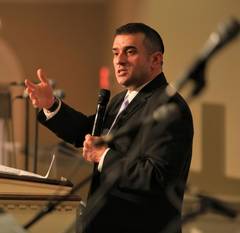- About Us
- Learning
- Resources
- Get Involved
- Membership
- Jobs
Leprosy in the Time of Coronavirus
04/22/2020 11:12:24 AM
Rabbi Brent Spodek
| Author | |
| Date Added | |
| Automatically create summary | |
| Summary |
What do you do when people start to
 |
By William Brassey Hole (1846-1917) from “Old Testament History” (Eyre and Spottiswoode 1925). |
get sick? How do we, as a society, treat a terrifying, contagious disease?
Sometimes, our strongest impulse is to draw them close and alleviate their suffering. We who are comfortable see those in distress and agony and want to take away all their pain. Sometimes, we really do want to throw open our doors and invite all who are hungry to come and eat.
Other times, however, we are overwhelmed by the suffering which the unlucky endure. We fear the sick - we fear we might catch what they have, and more than that, we fear that our own lives could be overturned in a moment and so we prefer to keep that disturbing idea at arm's length.
The rabbis of the Talmud recognize these contradictory impulses of compassion and disgust when they consider the leper who must be put outside the camp, certainly one of the most wretched characters of the Torah. We read this week, in the double portion of Tazria/Metzora, of characters who suffer from frightful skin diseases. All manner of incantations and salves and offerings are suggested to save them, but ultimately the unluckiest of them have to live outside the camp, away from everyone else.
The Torah demands that an incorrigible leper must run through the community screaming "Impure!! Impure!" leading the rabbis of the Talmud to ask why someone so afflicted should have to compound his shame and make a spectacle of himself. Rabbi Abahu, perhaps speaking for all of us who make sure our car doors are locked when we travel through bad neighborhoods, says it is so that we, the healthy, can protect ourselves from him. Seemingly cursed, this man threatens our healthy and ordered lives and needs to be kept at a distance.
But the Talmud, which knows that life's complex questions are not easily answered, contains another voice as well. Another teacher, speaking for those of us who want to cry when we see the body count climb and climb, says the leper announces his shame so the public will pray for him. This teacher hears the cry of the wretched and his first impulse is to respond to him in the best way he knows how. The miserable aren't to be feared, but loved.
The Talmud, which tries to capture the fluid and contradictory nature of human existence, lets both teachings endure. Both compassion and fear stand, intermingled in our response to the miserable.
But while the rabbis of the Talmud acknowledge our contradictory responses to suffering, they subtly announce their preference with their selection of the Haftarah. The story begins with four lepers who have been put outside the city of Samaria, which is besieged to the point that some of its inhabitants survive by cannibalism. With no access to food or medicine, the lepers are left to wonder if their death will come from hunger, illness or violence when suddenly one asks the other, "Why should we sit here, waiting to die? Let's go over to the besieging Aramean army who will either give us scraps of food or kill us on the spot. We‘ve got nothing to lose."
The four lepers set off and discover that unexpectedly, the besieging Aramean soldiers have abandoned their camp, leaving their stockpiles and supplies for anyone who might want them. The lepers feast like kings and then, shockingly, they suppress any impulse toward vengeance against the city that left them to die. They return to the Samaritans who had abandoned them to inform them that the siege is over.
In the span of a day, the lepers are transformed from the weak to the powerful. In the morning, they had nothing, not even a reason to live, and by nightfall, they had the knowledge to save the once-mighty city of Samaria. No doubt, they also had two competing impulses, one to reach out to those who suffered, and one to abandon the city and let its inhabitants reap what they had sown. But while they may have felt both impulses, they acted on the better one.
So too in this era, when we are facing a disease as frightening to us as leprosy was to our ancient ancestors. In our hearts and in our society, there is the impulse to fear and despise the sick, lest this virus infect us and the ones closest to us. Our tradition does not negate that impulse, but it does urge us not to follow it. We are all creations of the Holy One - the sick and the not-yet-sick alike.
Mon, November 3 2025
12 Cheshvan 5786
RABBI BRENT SPODEK

Join Our Mailing List
Privacy Settings | Privacy Policy | Member Terms
©2025 All rights reserved. Find out more about ShulCloud


